They say money makes the world go round, so why do we rarely talk about the state of our own finances?
Sometimes, it’s due to a fear of what other people may think or guilt around how much (or shame about how little) we earn.
Since 44% of Americans say personal finance is the most difficult topic to talk about, it’s no wonder it’s seen as a taboo subject. Still, our inability to talk about money is holding us back. It keeps us in limiting beliefs and encourages us to develop unhealthy habits that negatively impact our relationships and lives.
What if we took a different approach to money in this new year?
What if we decided, once and for all, to create safe spaces to talk about money and help people win in their finances?
If you’re wondering how to go about this with your audience, a financial New Year’s resolution quiz could be the answer. Quizzes give us a new way to have conversations about personal finance without the vulnerability hangover that often comes with talking about money.
Within your quiz, you’ll choose a series of finance-focused questions with a variety of answer options for quiz-takers to choose from. Your audience will have an opportunity to sit down and really think through their financial goals, plans, habits, strengths, and weaknesses.
If this wasn’t enough of a reason to create a quiz, you’ll also be able to:
- Generate high-quality leads and subscribers for your email list
- Make a stronger connection with your audience through personalized financial advice based on their quiz results
- Build trust by recommending relevant resources on your blog, podcast, or video show
- Sell more of your products and services by converting more email subscribers
Sound good? We’re just getting started!
Let’s begin by talking more about financial resolutions, so you’ll know how to create interesting content for your engaging quiz.
What does it mean to make a financial resolution?
Have you noticed how at the beginning of a new year, there’s a sense of buzz and excitement that hangs in the air? Although we know nothing actually changes when December 31 becomes January 1, it doesn’t stop us from trying to press the reset button on our old habits and actions.
Starting a new calendar year can give us the motivation and momentum we need to get started on our goals. So, why not tap into one of the most joyful and hopeful times of the year when creating your financial quiz?
As you begin thinking about the theme of your quiz, consider talking about setting financial New Year’s resolutions. We know that 50% of Americans make New Year’s resolutions each year, but fewer than 10% of adults actually keep them.
Experts say the people who successfully keep their New Year’s resolutions are usually the ones who set specific goals and make their resolutions measurable. By doing so, they feel empowered to check in with themselves, track their progress, and build momentum.
James Clear, a top researcher, author, and expert on creating habits, says it takes on average 66 days for a new action to become an automatic habit. The exact amount of days varies from person to person, but around two to three months is a general rule of thumb.
This means for a financial New Year’s resolution to really stick, you have to maintain and practice your habits well beyond March. As you create your quiz, remember that goal retention is your ultimate desired outcome. Every piece of content or information you share should help your quiz-takers get closer to achieving their resolutions.
What are the most popular financial New Year’s resolutions?
There are a wide variety of financial New Year’s resolutions a person may choose from. While each person’s financial reality is different, there are a few goals people may have in common. Your job is to identify these goals so you can create helpful content around each one.
Some of the most popular financial resolutions include:
- Saving for a down payment on a home (10-20% is usually recommended)
- Setting a budget that can be updated weekly or monthly
- Taking an international trip or a relaxing vacation
- Starting a business or pursuing self-employment
- Striving to improve credit scores and paying bills on time
- Creating an emergency fund for unexpected expenses
- Paying off student loans or credit card debt
- Investing more in the stock market or retirement accounts
Some people take saving money to the extreme with a “no buy” year, while others might make a resolution to contribute the maximum amount to their retirement IRA investment.
No matter what kind of financial goal your audience has, you can use a quiz to identify their goals and understand the motivation behind each one.
How do you know if you should keep a New Year’s resolution or let it go?
Unfortunately, some people fail with their resolutions because they weren’t realistic to begin with. At the start of a new year, it might be hard to determine whether a New Year’s resolution is not only attainable but also worth the sacrifice and work.
Still, no one becomes a new person with fully formed habits overnight. Nonetheless, it’s a worthy question when you’re faced with competing goals and resolutions at the start of a new year. It takes a personal investment of time and energy to make a resolution stick, so let’s talk more about what it takes to keep or ditch New Year’s resolutions.
It’s usually a good idea to continue with financial resolutions if your financial health is suffering because you’re struggling to reach a specific goal.
If you’re overworked in your career and need to cut back, it’s important to make daily sacrifices and forgo non-essential purchases so you don’t have to put in as much time at work to maintain your lifestyle. On the other hand, if you’re making a career change, it could be a good idea to reduce your hours or ask for a raise if your plan is to go back to school.
Keeping financial resolutions is also beneficial in overcoming negative money mindsets. Too many people avoid talking about money or looking at their bank statements at all costs, much to their own detriment. Money can seem like a scary thing, but with your quiz, you can bring positivity to the subject.
Limiting beliefs around money often sound like:
- “There’s not enough money for everyone.”
- “I can never make as much money as ____.”
- “Money is evil.”
- “Money means more to manage.”
- “I can either make money or do what I love.”
- “I have to work hard for money.”
Of course, this isn’t an exhaustive list, but it’s a good start in understanding what thoughts may be driving your audience. When someone is able to keep their financial resolution, they’ll be more likely to critically think about their limiting beliefs and challenge them head-on as they move toward their financial goals.
However, sometimes it’s best to ditch financial resolutions. It seems odd to say that, but when you set a resolution that’s nearly impossible to meet in your current situation, you’re setting yourself up for failure.
For example, if someone has a job with a yearly salary of $50,000 but wants to save $100,000 over the next year, that may be extremely difficult to do unless they have a side hustle helping them bring in more income. That’s why we recommend setting intentionally ambitious goals that stretch you but aren’t unattainable.
In the end, the best way to avoid breaking a resolution is to make a better one in the first place. (PS: Your quiz can help people with this!)
This means choosing a resolution that is:
- Specific to your financial goals
- Easily measurable so you can track your progress
- Aligned with your desires and values rather than someone else’s
- Takes your current situation into account
- Related to your vision for the future
If your audience is thinking about setting the wrong financial New Year’s resolution based on their goals, you can use a quiz to introduce them to a new path forward. This will help them open their mind to new possibilities for how they can save, spend, invest, and give their money in the new year.
All of this sounds great, but how can you be sure that a financial resolutions quiz is a good fit for your audience? Keep reading to find out.
Different industries that can benefit from a financial resolutions quiz
It may seem obvious for credit card companies or banks to use a quiz like this to inform their wide audiences, but there are plenty of other industries who can use this kind of quiz. It’s time to get creative!
Business coaches: What is the one thing you need to stay in business? Money, of course! It’s not surprising, then, that many business coaches focus on a business’s finances. If you want to create a quiz as a business coach, you have a lot of creative freedom. For example, Stacy Tuschl, an author and sought after business coach, uses an Interact quiz to reveal what revenue blocks might be keeping business owners from generating more sales. However, you can bring a quiz of your own to life to talk more about financial New Year’s resolutions.
Personal finance bloggers: If personal finance is a common topic on your blog, a financial resolutions quiz would be a great fit! Your audience is already used to gaining financial strategies and knowledge from your blog, so a quiz will help them receive advice that’s tailored to them. If you are a personal finance blogger, share your own story within your follow-up email series so you’re seen as more relatable. While it’s nice to learn from experts, it’s even better to learn from someone who feels like a knowledgeable yet approachable friend.
Money mindset coaches: We’ve talked at length about the effects of money mindsets, so coaches who focus on helping clients reframe their mindsets could greatly benefit from a quiz. Before working with a coach, some potential clients might not be aware of what mindsets are holding them back, but a quiz can help them identify what their limiting beliefs are and how to move past them. For more inspiration, take a look at Melyssa Griffin’s money magnetism archetype quiz (complete with stunning quiz result landing pages!). As a money mindset educator, Melyssa loves using quizzes to teach her audience more about this subject and how it relates to running a business, which is the ultimate goal of her content. When creating a quiz like this one, think about how money mindsets might relate to your business, and then create a financial resolutions quiz around it.
Bookkeepers: The main job of a bookkeeper is to make sure a business’s finances are organized and frequently updated. They handle everything from categorizing transactions to payroll processing to paying bills on time. If a bookkeeper was to create a financial quiz, they might want to focus on understanding the growth goals of each business and what current state the business owner’s finances are in. They can collect all of this data in a quiz that’s fun and easy to take!
Accountants: Often partnered with ongoing bookkeepers, accountants help business owners and employees prepare and file their tax returns, among other things. They can also earn the title of Certified Professional Accountant (CPA) after they pass a specific exam. Accountants could focus their quiz on relevant topics like tax preparation, finance tracking, or file organization, so people can set themselves up for their best financial year ever.
CFO for hire: While you may be used to hearing about CFOs (or Chief Financial Officers) in Fortune 500 companies, there are some service providers who brand themselves as a CFO for hire. Instead of working inside one business, they consult with multiple businesses about high-level financial strategies. If this sounds like you, you’re in luck because Liz Lajoie of Zen Money CFO has already paved the way for you with her What’s Your Unique Money Style? quiz. Take her quiz to get inspiration for your own as you relate it more to New Year’s resolutions.
There are more industries that could benefit from a quiz than the ones listed here, but if you find yours on the list, you might be perfectly primed to get started.
You can learn Everything You Need to Know to Launch Your First Quiz inside this how-to guide, but you’ll first want to sign up for a free Interact account.
Once you decide on a quiz topic, you’ll be ready for the next step in the process: choosing your quiz questions!
12 questions to use in your financial New Year’s resolution quiz
If you’re sold on using a financial New Year’s resolution quiz to engage with your audience, I’ll show you some examples so you don’t need to start from scratch.
It’s way easier to start with a template, and we have hundreds of them in our quiz template library (or click here to see the finance-related quiz templates). Since we recommend creating a quiz with seven to ten questions, you can use any of these quiz question examples as you begin to create your quiz.
- How do you currently feel about your financial resolutions?
- Picture what it looks like to achieve your financial resolution. What do you see?
- How will you start the new year off in a positive way?
- There’s a copy of Money magazine near you. Which article would you want to read first?
- How can you make this new year the best year of your life?
- What are you saving for?
- Do you prepare a personal monthly or weekly budget?
- If we were chatting over coffee, how would you summarize your financial life right now?
- How do you measure financial success?
- On a scale of 1 to 10, how do you feel about your financial goals?
- What financial hang-ups do you need to avoid in the new year?
- At the end of this year, I want to…
How do you currently feel about your financial resolutions?
Before a resolution can become a habit, a person needs to set a goal and stick with it. One of the best ways for them to accomplish this is to align their financial goals with how they ideally want to feel. This concept of “core desired feelings” was coined by Danielle LaPorte, who encourages her readers to focus not only on what they want to achieve, but also on how they want to feel.
Take inspiration from her by asking your audience how they’re feeling about their financial resolutions. Are they nervous, scared, excited, or all of the above? How someone feels about their financial future will give you a good idea of how likely they are to stick with their resolutions.
Since 92% of people fail in their resolutions by the end of the year, this question helps your audience start to think about what it will take to reach their goals early on.
Here are a few sample answers you can use for your own quiz:
- I’m ready to meet all of my goals… new year, new me!
- I’m excited but not sure if I have what it takes to make them happen.
- I have a feeling I might ditch them a few weeks in, to be honest.
- What if I haven’t made my financial resolutions yet?

Picture what it looks like to achieve your financial resolution. What do you see?
This question gives your audience an opportunity to open their minds and imagine what it could look like to feel in control of their personal finances. Most people will say they hope to feel more confident and financially secure, so let’s think outside the box when creating your quiz answers.
We can bring more of the quiz-taker’s vision to life by painting a picture of what financial freedom may look like. Some people might want to travel the world, while others may want to invest in their dream home. Understanding your audience’s motivations provides you with the insights you need to give them personalized financial advice that wins their trust.
Help your audience envision their future with these sample answers:
- The ability to buy or renovate my dream home.
- The freedom to travel the world without worrying about money.
- The confidence to build a team so I can work fewer hours.
- The opportunity to go on a fun, worry-free shopping spree.

How will you start the new year off in a positive way?
Whether you love the start of a new year or see it as just another day on the calendar, it’s nice to use the exciting energy it brings to reset your financial habits. If you’ve been wanting to save toward something specific or invest more of your net income, why not set goals at the beginning of the year?
Instead of thinking this year is going to be like every other year, inspire your audience to look at their financial future differently. The answers to this question can highlight actionable steps your audience can take or goals for them to focus on. No matter how you use this question, it would be a great one to start with in your own quiz.
Sample answers could include:
- Ask for a raise and a promotion.
- Set a financial goal for the year.
- Make a contribution to my IRA.
- Figure out what my net worth is.

There’s a copy of Money magazine near you. Which article would you want to read first?
Let’s have more fun with your financial New Year’s resolutions quiz, shall we? We can start with this light-hearted quiz question. It’ll give you a brand new way to talk about money management and personal finance, while making your quiz as enjoyable as a Buzzfeed-style quiz.
Who said financial advice has to be stuffy? This quiz question is perfect for all industries to use, but feel free to adjust or customize the titles based on your exact quiz result types. This is sure to be a crowd favorite!
Sample answers for this question could include titles from our quiz template:
- How to Get Out of Debt Quickly and Easily
- How to Grow Your Wealth Without an Advanced Finance Degree
- How to Budget for People Who Hate Budgeting
- How to Improve Your Emotional Relationship With Money

How can you make this new year the best year of your life?
Who doesn’t want to start the new year on a hopeful note? This is a great question to ask at the very beginning or end of your quiz to lighten the mood. Money can be a serious topic, so infusing some joy and delight in your financial New Year’s resolution quiz will bring positivity to the subject.
You can focus the answers to this quiz question on personal finances or keep it more general. It depends on the content strategy behind your quiz. Have fun with this question!
Here are a few answers you might want to consider using:
- Earn more passive income with my business.
- Hire more team members so I can take more time off.
- Save up for the vacation I’ve been dreaming about.
- Increase my prices and book more clients.
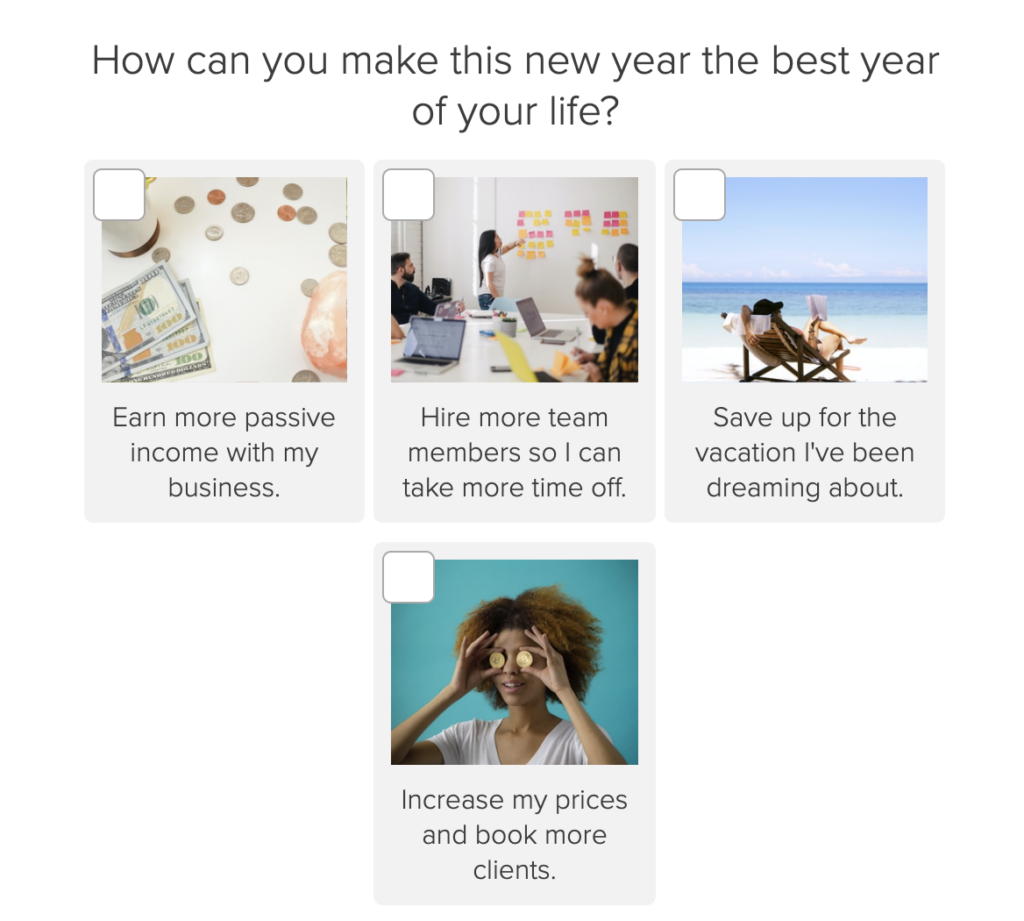
What are you saving for?
Most financial experts break down personal finance into three main categories: fixed expenses, variable expenses, and non-necessities. On the surface, this seems to be all about how someone spends their money, but it also relates to how much money they have left to save. For this particular quiz question, we want to understand the motivating factor behind why someone wants to save more money.
Saving money instead of immediately spending it can take a great deal of sacrifice, so identifying what your quiz-takers are currently saving for will give you necessary insight into what’s truly important to them. Based on their goals and values, you can recommend relevant content or products that may help them achieve their savings goal. If your resources make a positive impact in their savings journey, the quiz-taker will be more likely to work with you in the future.
Here are a few answers you can use from one of our quiz templates:
- House or wedding
- Vacation
- My own business
- For emergencies or retirement
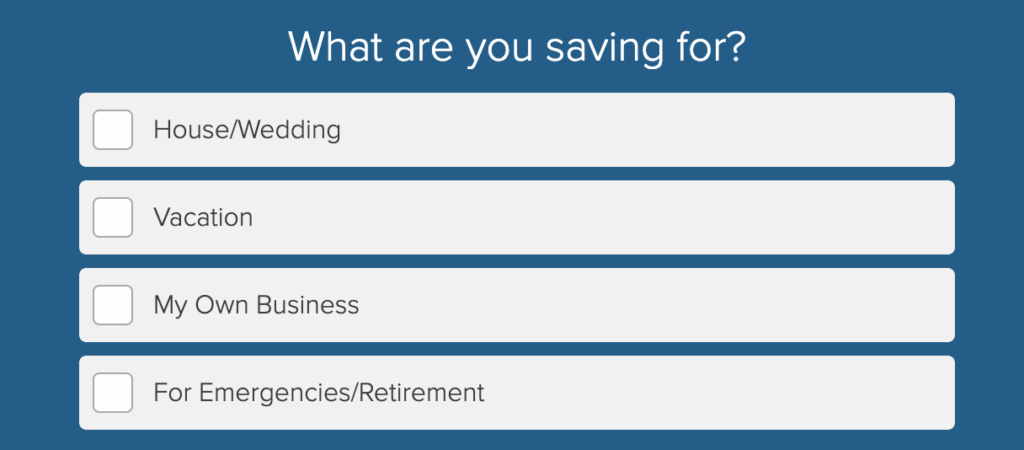
Do you prepare a personal monthly or weekly budget?
If you want to help your audience create a simplified plan for how to intentionally spend their money, budgeting is the answer. By using a budget, your audience can track their spending and compare it to their goals. That way, they’ll have clearer boundaries guiding them on how to spend, save, and invest their income.
Getting started with a budget can be a daunting task, especially if someone hasn’t created a budget before. You can use a financial New Year’s resolutions quiz to introduce the concept of budgeting and encourage quiz-takers to learn more, all while gauging where they currently are in this process.
Here are a few quiz answers you could include from one of our quiz templates:
- Yes, I always prepare and stick to a budget.
- I try to keep up with a budget but occasionally lapse.
- I have tried to keep a budget but find it difficult to follow.
- I do not prepare a personal budget at all.
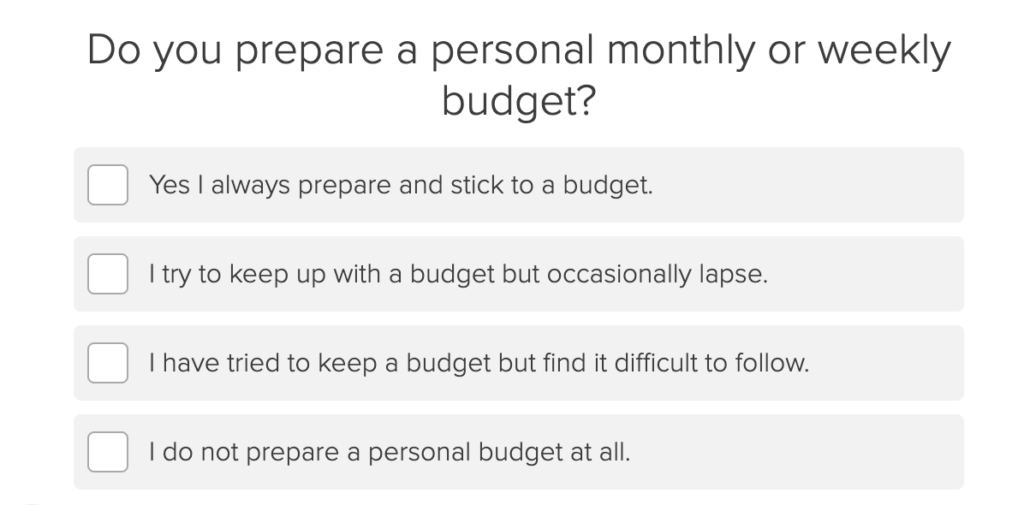
If we were chatting over coffee, how would you summarize your financial life right now?
Since money is one of the most difficult topics to talk about, use your quiz to make the subject feel less overwhelming and heavy. Using an opener like “If we were chatting over coffee…” immediately positions your brand as relatable and personable.
When someone reads this quiz question, they won’t feel judged if they answer truthfully about their current financial situation. This sets up a safe zone for them to share where they are currently, but we also recommend including other questions that feel more positive so the quiz has an uplifting tone.
Start by using answers from one of our quiz templates:
- I have debt, and it feels like I’ll never get rid of it.
- I feel like I’m making enough money, and I want to save and invest more.
- I feel pretty unknowledgeable but not super stressed. It just feels like my money is leaking out of my control.
- I know what I should be doing with my money, but I can’t seem to actually do it.

How do you measure financial success?
If you look on social media, it may seem like everyone wants the same things: flashy cars, multi-million-dollar homes, private jets, and vacations around the world. However, if you take a closer look, you’ll realize that millions of people would skip these luxuries if they were able to spend more time with their families or have more freedom to work on creative projects they love.
This is why it’s important to understand how your audience members measure financial success. Their answer usually tells you a lot about their financial goals, but it’ll also give you an idea of what their ultimate dream looks like. Whether their vision is big or small, this question will give you invaluable insight into what drives each person.
Sample answers could include:
- How much time I’m able to spend with my family.
- How soon I’m able to live the laptop lifestyle!
- How much freedom I have to choose which projects I work on.
- How soon I’m able to spend money without worrying about debt.
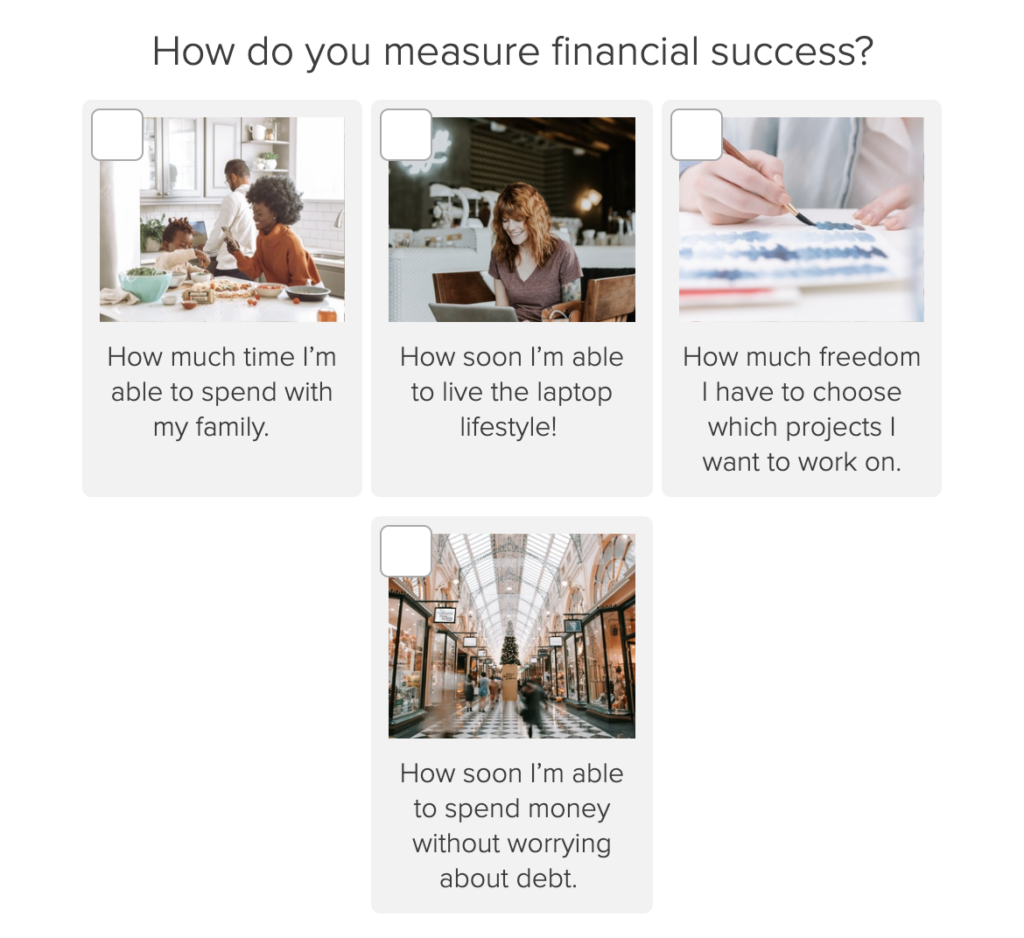
On a scale of 1 to 10, how do you feel about your financial goals?
This question may be helpful for people who have a hard time describing their current financial situation. Instead of using descriptors to talk about their financial resolutions, they can easily locate where they are on a number scale to indicate their feelings.
For example, someone who feels like they’re at the bottom of the scale wouldn’t feel very confident in their current financial health. However, someone who chooses a number at the top of the scale would likely feel like they’re on the right track with their goals.
This question can be used to collect relevant data from your audience. Depending on how someone answers, you might also want to give quiz-takers a few personalized strategies based on what stage they’re currently in. That way, you won’t risk alienating your audience by assuming everyone needs the same resources.
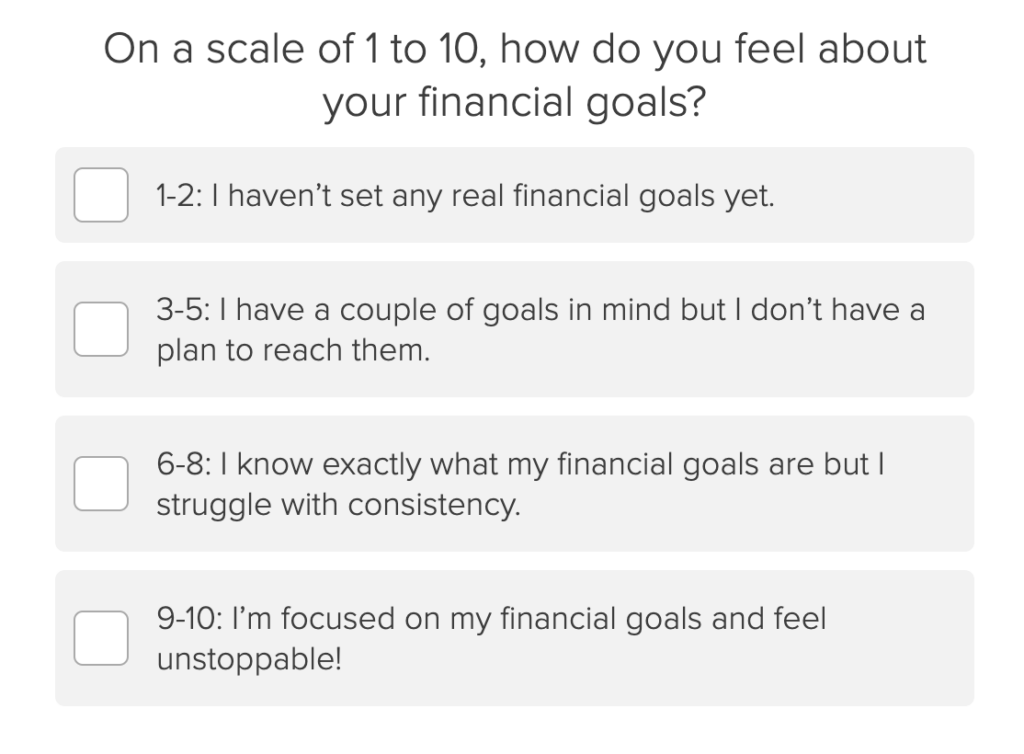
Feel free to use these sample answers if you get stuck:
- 1-2: I haven’t set any real financial goals yet.
- 3-5: I have a couple of goals in mind, but I don’t have a plan to reach them.
- 6-8: I know exactly what my financial goals are, but I struggle with consistency.
- 9-10: I’m focused on my financial goals and feel unstoppable!
What financial hang-ups do you need to avoid in the new year?
Is there something that’s holding your audience back from reaching their financial goals? This quiz question will give you a clear answer of what their roadblock is. When you know what struggles they’re facing, you can follow up through a personalized email sequence with tips and advice that uniquely fits their situation.
It wouldn’t make sense to send them a list of resources on savings tips if they are focused on investing strategies. In the same vein, you don’t want to give them links to podcast episodes about budgeting if they already have that under control. This quiz question will be most beneficial for business owners who offer a suite of products or services that can help quiz-takers overcome each obstacle.
You can use the examples below or customize them for your business:
- Forgetting to pay my bills
- Overspending on my credit cards
- Not giving myself a budget
- Losing sight of my long-term goals

At the end of this year, I want to…
This quiz question will help your audience envision where they’d like to be in one year. Twelve months gives someone ample time to reach their goals and accomplish what they set out to do at the beginning of the year.
If you want to add this question to your quiz, we recommend including a wide range of personal-finance goals. For example, someone who answers with “paying off student loans” would be in a different life stage than someone who says “maxing out retirement accounts.” Try to use the data collected from this quiz question when you create content for your ideal audience.
Sample answers to this question could include:
- Pay off my student loans
- Create an emergency fund
- Pay off my credit card debt
- Max out my retirement accounts

Create your own financial New Year’s resolutions quiz
With your quiz topic in mind and multiple quiz questions at the ready, it’s time to create your own quiz inside Interact! Start by signing up for a free account and then open up the user-friendly quiz-builder. Our tool will guide you through the next steps!

Here are a few more resources that will help you along the way:
- How to Make a Personality Quiz
- Exactly How to Write Your Quiz Questions and Answers from Scratch
- 50 Quiz Questions You Should Be Using
- How to Create Customer Personas for Your Personality Quiz
- Your Complete Guide to Quiz Design
Happy creating!